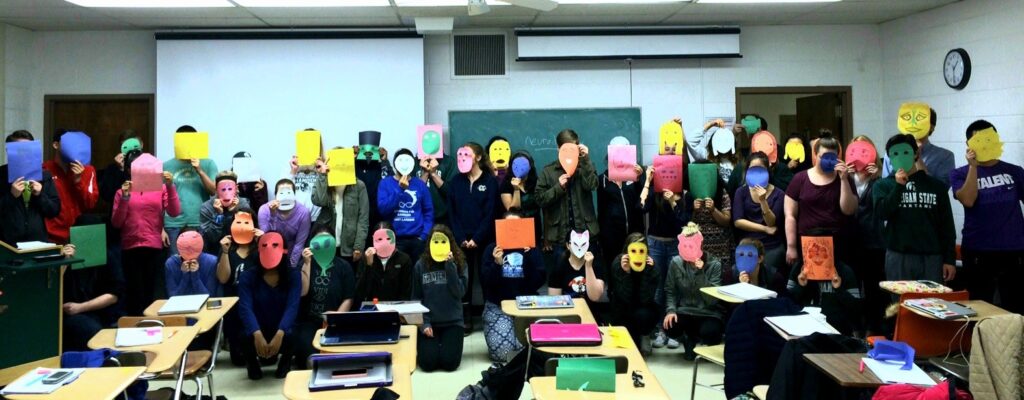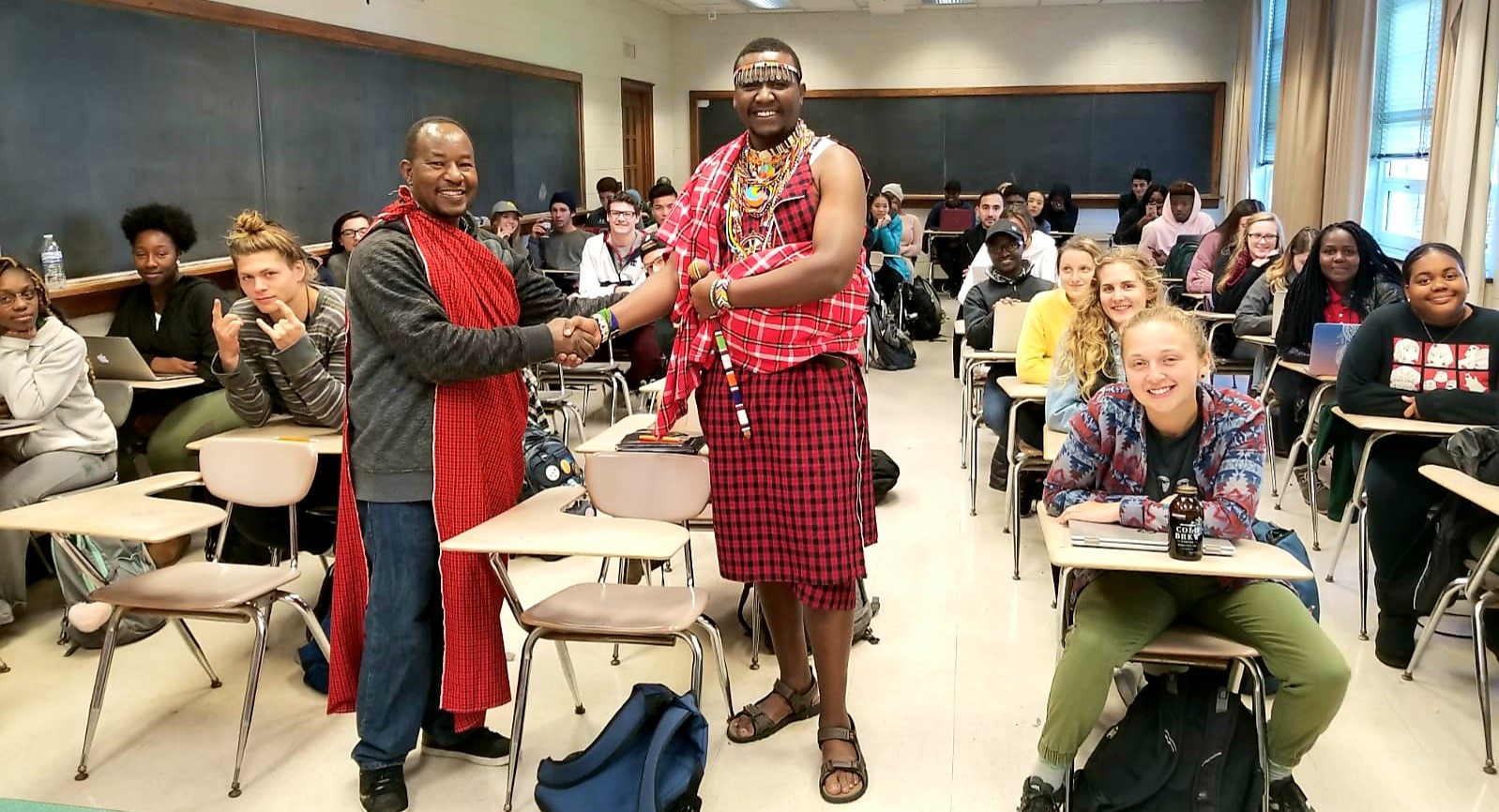Delivering general education curriculum in the arts and humanities requires some ingenuity to put the human experience into context. Faculty and instructors who teach in MSU’s Center for Integrative Studies in the Arts and Humanities (CISAH) in the College of Arts & Letters continually meet this challenge by taking innovative approaches to teaching essential subjects.
“The way we teach the arts and humanities has changed a lot over the years,” said Ellen Moll, Assistant Director for CISAH. “Faculty are driving those changes through their interests and research by creating fascinating courses that help students see the relevance of the arts and humanities in their lives.”
The way we teach the arts and humanities has changed a lot over the years. Faculty are driving those changes through their interests and research by creating fascinating courses that help students see the relevance of the arts and humanities in their lives.
Ellen Moll, Assistant Director for CISAH
While credits in Integrative Arts and Humanities (IAH) are required for graduation, MSU offers a deep bench of courses with exciting, contemporary twists to spark student interest that may lead to additional studies. New and revamped courses include those that delve into the relationship of the arts and humanities to health and well-being, social justice and ethics, and to race, gender, and identity. Group projects, popular culture, and community outreach are among the tools instructors reach for to foster understanding and critical thinking in students.
“By giving students a variety of topics to get excited about, we’re hoping they can see how the arts and humanities provide the basis for addressing the complex and enormous problems we face today,” Moll said. “Our ultimate goal is to help students not just integrate different disciplines, but to understand how the arts and humanities connect to and shape our lives.”
The following highlights several new IAH courses developed by faculty who teach in CISAH, as well as a number of courses adapted to reflect contemporary issues. For more information on courses offered through the CISAH, visit the Center for Integrative Studies in the Arts and Humanities website.
Full Circles: Race and Gender in Lovecraft Country (IAH 207)
This course, to be offered for the first time in Spring 2021, explores how the HBO drama series, Lovecraft Country, remixes and revises classic horror themes by examining the book and series alongside works of genre literature. Beginning with the Matt Ruff novel, students will watch each episode of the series and place its themes in conversation with short stories, novellas, television shows, and films by creators such as HP Lovecraft, Victor LaValle, NK Jemisin, and Wes Craven.

“Critical thinking is important in any discipline and will serve our students well in any job they find themselves in,” said Kinitra Brooks, Associate Professor of English and the Leslie Endowed Chair in Literary Studies, who developed the course. “It is crucial to know how to take information gleaned from the page or screen, assess and analyze the information, and ask pointed questions illuminating strengths and weaknesses. The humanities are a necessary part of acquiring and perfecting problem-solving skills.”
Creative Process: How Does Art Promote Change? Facilitating Arts Events About Mental Health (IAH 241E)
This new course, to be offered for the first time in Spring 2021, will teach students through a curriculum of arts-based activities to help them understand anxiety and depression. The activities will become a series that students facilitate for other students late in the semester. Exercises include using acting to get into a positive inner monologue headspace of a character, creating individualized playlists, writing six-word stories, or using mindset statements to reduce anxiety and depression.
Studies on neuroscience and learning suggest that art inspires empathy, which can play a key role in changing hearts and minds.
Mary Beth Heeder, Instructor of First-Year Writing
This team-taught course involves multiple faculty and guests and is led by Professor Rob Roznowski, Head of Acting and Directing in the Department of Theatre, and facilitated by Mary Beth Heeder, Instructor of First-Year Writing, Senior Consultant and Project Manager for Student Success Academic Projects and Pathways Initiatives. Additional faculty for this class include Kellyn Uhl (Dance), Marcie Ray (Music), and Michelle Word (Broad Art Museum).
“Studies on neuroscience and learning suggest that art inspires empathy, which can play a key role in changing hearts and minds,” Heeder said. “As students and faculty co-construct learning by experiencing art, we hope students will understand that they are not the only ones experiencing challenges, and they will feel a greater sense of belonging and well-being and have a greater capacity to learn.”
Area Studies Africa (I): African Cultures, Languages, and Literature (IAH 211A)

This course examines African cultures, languages, and literature and is designated as one of the international (I) courses needed to fulfill the diversity requirement for graduation. Developed and offered for the first time in Fall 2014, the class emphasizes global issues, ideas, and perspectives within the African context. The course enables students to offer informed and sophisticated answers to questions about Africa’s historical, social, cultural, economic, and political profile. One key project involves students creating their own knowledge about Africa by interviewing a member of the MSU community from Africa on a specific topic and presenting their findings to the class.
“In this course, students not only appreciate the usefulness of diversity, equity, and inclusion, but also acknowledge the role of historical, environmental, cultural, and other factors in creating the contemporary African or world society,” said Jonathan Choti, Assistant Professor of African Languages and Culture. “I developed this course to push students to discover the common issues that occur among people in today’s interconnected, interdependent world, and to become global citizens who are energized to make a positive difference at home and abroad.”
Performing Arts and Health Care (IAH 209)

This course, which was developed in 2014 and has been offered every two years, including Summer 2020, explores the social and cultural side of medicine and expressive arts therapy. Students engage in intergenerational service learning, working with seniors at the Burcham Hills Retirement Community and various Ingham County Community Centers. Students participate in dance, drama, or narrative therapeutic activities, but do not provide therapy.
“The arts allow us to embrace the very human subjects of life, death, health, and medicine,” said Alison Dobbins, Associate Professor of Theatre, who teaches the course.
Afrofrantastic: Race, Power, and Gender in the Black Imaginary (IAH 207)
This course provides a broad overview of the definition and meaning of Afrofuturism in the context of the United States. First offered in Fall 2018 and taught every year since, the course seeks to provide students with a definition of Afrofuturism and understanding of its implication as a new way of seeing culture and understanding knowledge.

“This course offers the opportunity to think about race, ideology, and how society is constructed,” said Julian Chambliss, Professor of English, who developed the course. “By studying Afrofuturism, we can see how to decenter oppressive practices and embrace transformative ideas about equity and community that offer a path forward for society.”
Human Values and the Arts and Humanities: Democratic/Civic Values (IAH 231A)
This course focuses on the way artists, writers, and intellectuals respond to moments of crisis in democratic societies. Students examine the role of arts and cultural organizations in our individual lives and in civil society through readings and discussions in three areas: 1) the possibility of personal growth and intellectual development, 2) the role of higher education in developing informed and effective citizens, and 3) understanding the role of professional workers in a well-functioning society.
The integrated study of arts and humanities can help students understand the responsibilities they have when applying knowledge and solving problems within their future professions.
Eileen Roraback, Faculty and Curriculum Development and Teaching Specialist
A key assignment helps students see how professional work has both the unique freedom to apply knowledge and judgment to problem-solving as well as unique responsibility to the wider society. Students apply professional Codes of Ethics related to their chosen career fields to decision making when confronting complex ethical questions and challenges in a professional context. Eileen Roraback, Faculty and Curriculum Development and Teaching Specialist, developed the assignment in Spring 2015 and has taught the course since 2013.
“The integrated study of arts and humanities can help students understand the responsibilities they have when applying knowledge and solving problems within their future professions,” Roraback said. “By focusing on ideas related to human experience, students become more aware of important issues that affect people in an interdependent world.”
